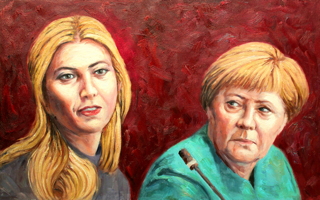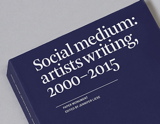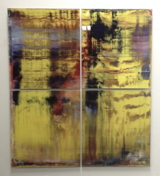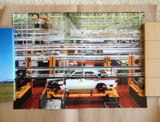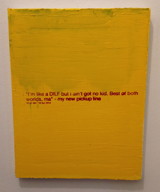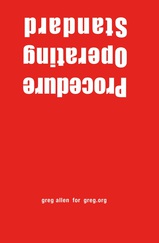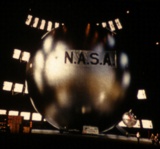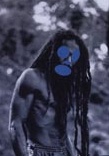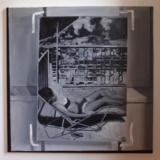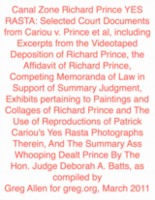Here's Sherrie Levine talking in 1993 about the making of her Meltdown woodblock print series with BAM's Constance Lewallen in the Journal of Contemporary Art. Levine did just what Susan Tallman, who reviewed Meltdown kind of negatively in 1990, feared: she used the computer algorithm to color-average the entire images of Mondrian, Monet, etc., and then she used the "Mardenesque" greys to paint monochrome canvases. It wasn't a bug, it's a feature.
The JCA transcript has a funny find&replace quirk, where all the SL's were replaced with Levine [e.g., slide >> Levineide]:
Lewallen: You did some woodblock prints recently, I noticed, that had to do with the "Meltdown" paintings. Where did you do them?Levine's Meltdown (After Yves Klein), 1991, was in Daniel Birnbaum's Italian Pavilion at Venice last year. AFC got the photo, if not the concept.Levine: I worked with a wonderful printer, Maurice Sanchez. I had wanted to do prints based on a geometric grid with computer averages of colors of modern master paintings.
Lewallen: Which paintings did you use as a starting point?
Levine: For example, we used a Monet "Cathedral." We put a Levineide of the picture into a computer with graphic capabilities and the computer created a grid in which each section corresponded to an average of the color in that section of the painting. The "Meltdown" paintings are based on the same principle but rather than being gridded off, they represent one uniform average for the whole surface. In fact, it's funny, I had been wanting to make work after Marden's early work, because some of his monochromes are some of my favorite paintings. For me they are the ultimate late-Modern paintings. I am also a big fan of Olivier Mosset's monochrome paintings, and Yves Klein is another favorite of mine. For years I have been trying to think of a way to make monochromes that were interesting but not the same as those I admired, but I never came up with a solution. Then, when I was working on the print project, almost as a mistake, the computer also gave me the color average of the entire . . .
Lewallen: So, the print project preceded the paintings?
Levine: Yes, the average of the entire painting, all the colors in the painting, like when you mix your whole palette together you get these beautiful, Mardenesque greys and greens and mauves. And I realized I had finally found a method.
Lewallen: What were the colors like in the prints, working with color mixes from grid to grid?
Levine: They were much less greyed down than the paintings.
Lewallen: Depending on the section.
Levine: I originally thought they should be lithographs or silkscreens, and Maurice came up with the wonderful idea of woodcuts on Japanese rice paper. He used a high-tech method; he made a grid of the twelve tongue-and-groove blocks using a laser saw that he inked up separately and printed all at once. I liked the combination of high-tech and low-tech techniques.

